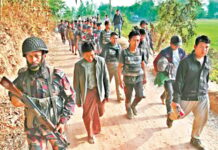
The series of dialogues, hosted by Prime Minister Sheikh Hasina, also Awami League president, will begin today with the Jatiya Oikya Front, a newly formed coalition led by eminent jurist Dr Kamal Hossain
Citizens from all walks of life are looking forward to a successful and fruitful dialogue between the ruling Awami League and the political opposition that will begin today, hoping that they will pave a way to ensure a peaceful atmosphere during the next parliamentary election.
The series of dialogues, hosted by Prime Minister Sheikh Hasina, also Awami League president, will begin today with the Jatiya Oikya Front, a newly formed coalition led by eminent jurist Dr Kamal Hossain.
The prime minister invited two political coalitions – Jatiya Oikya Front and Juktofront – and Jatiya Party, the opposition in parliament, for dialogue, responding to their requests to meet to discuss a free-fair, peaceful, participatory and credible election.
The decision comes in a period when politicians, civil society and the public were concerned about political unrest as the ruling party and oppositions were optimistic to gain political power.
The sudden move to hold talks and minimize political disputes will help the Election Commission hold a credible election, people from different spheres of life said when asked for their view on the matter.
This correspondent spoke to about 50 people from different walks of life ranging from rickshaw pullers, shopkeepers, security guards, drivers of buses and trucks to private job holders, journalists – to get their reaction on the dialogue process.
Respondents appeared satisfied with Awami League leaders, saying Bangladesh will see a politically stable situation if the dialogue comes out as a successful and fruitful initiative.
According to them, the question of holding a credible, participatory and peaceful election is highly dependent on the success of the dialogue.
However, some also claimed that this dialogue will not make any impact on the current political situation as none of the political alliances or parties are eager to compromise their stance.
Abu Hossain, who works as a security guard, said he is willing to cast his vote without fear.
“In the last election we all faced terrifying incidents and we were worried about the upcoming election that may be this time there will be more subversive activities. But the dialogue gives us hope,” he said.
Abu Taher, a private job holder, said the country will fall into dire problems if the dialogues are not successful.
“Political parties will show their efforts to hold a terror-free election through dialogue,” he hoped.
No more burning
Transport workers were particularly anxious about arson attacks like the ones that took place in 2014. Rickshaw pullers and bus truck drivers said they do not want to see arson and criminal activities again in the name of politics.
Violence spread in a two-year period before and after the 2014 parliamentary elections, as the BNP rejected and boycotted the polls and went into a movement.
Months of street protests preceded the January 5 election, in which scores of people were killed and hundreds of vehicles destroyed in arson attacks, badly tarnished the party’s image.
Moin Uddin left Rangpur five years ago and now he is pulling a rickshaw in the capital. Moin shared his horrifying experiences of the 2014 arson terrorism saying that he does not want to see people burnt alive again.
He expected that political parties will come to a peaceful solution of political stagnant through dialogue.
In 2014, drivers of buses and trucks were suffered most as they did not get out with their vehicles due to fear of being burnt.
Remembering those days, a 40-year-old truck driver Shah Alom from Jessore said that political leaders should show tolerance for the sake of country.
He also alleged that politicians of Bangladesh only think about party interests instead of the people or the country.
However, some were reluctant to believe that this dialogue will be fruitful, remembering the history of political dialogues in Bangladesh. They said political parties only sit together to fulfill their own agendas.
In 2013, Awami League president and Prime Minister Sheikh Hasina called Khaleda Zia over phone to hold dialogue between Awami League and BNP, but BNP chief Khaleda rejected Sheikh Hasina’s proposal.
In 2006, dialogue between then BNP secretary general Abdul Mannan Bhuiyan and Awami League general secretary Abdul Jalil went in vain, in the backdrop of major political tensions in the country.
Source: Dhaka Tribune.









